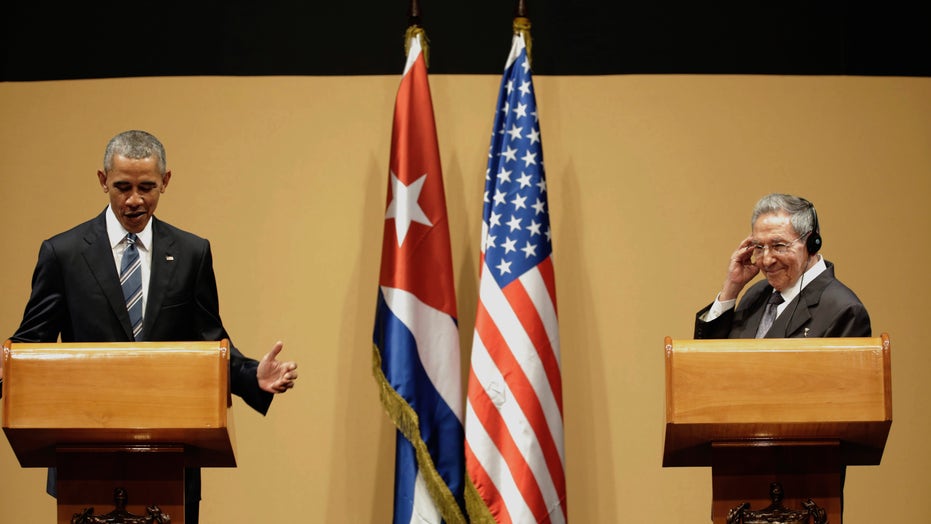For decades U.S. foreign policy toward Cuba has sharply divided politicians in Washington — and President Barack Obama’s visit to the island, which began on Sunday, has only widened this rift as the trip comes in the middle of a heated presidential campaign season.
Texas Sen. Ted Cruz, himself a son of a Cuban migrant, slammed Obama’s visit to the island –saying that the trip legitimizes the government of Raúl Castro.
“On Sunday, President Barack Obama, a retinue of celebrities in tow, is expected to arrive in the Cuban capital to hang out with Raúl Castro and his henchmen, all of which will be breathlessly documented by the media mavens along for the ride," Cruz wrote in the piece published in Politico, titled "In Cuba, Obama Will Legitimize the Corrupt and Ignore the Oppressed."
Cruz added: "Meanwhile, political prisoners languishing in dungeons across the island will hear this message: Nobody has your back. You’re alone with your tormentors. The world has forgotten about you."
According to the independent Cuban Commission for Human Rights and National Reconciliation, 1,141 Cubans detained for political reasons just last month.
Cruz, along with former candidate and Florida Sen. Marco Rubio, has been the most outspoken Republican candidate against the détente in tensions between Washington and Havana. The Texas lawmaker said that his father, who was "brutalized by Castro's thugs," found freedom in the United States.
"That freedom can come to Cuba, and I pledge to work to make it so. But it cannot happen by enriching and empowering the dictatorship, while they export terrorism throughout Latin America,” Cruz wrote. "And it cannot happen by forgetting the heroism and suffering of the brave souls who have opposed the Castros for so many decades."
Republican front-runner Donald Trump also weighed in Obama’s trip by criticizing the fact that Cuban President Raúl Castro did not greet the U.S. leader when he exited Air Force One in Havana.
“Wow, President Obama just landed in Cuba, a big deal, and Raul Castro wasn't even there to greet him,” Trump tweeted. “He greeted Pope and others. No respect.”
Castro greeted Pope Francis on his arrival in September and Russian Orthodox Patriarch Kirill when he visited last month.
A White House spokesperson said that it’s not taking any offense to Castro’s absence and that Monday's ceremony with Obama and Castro is considered to be the official welcome event. Instead of Castro, several dignitaries were on hand at the airport, including Cuban Foreign Minister Bruno Rodríguez and Cuban Ambassador to the U.S. José Cabañas.
The reaction to Obama’s trip from the Democratic presidential hopefuls was a bit more positive.
Vermont Sen. Bernie Sanders, who during the campaign has taken heat for his previous praise of former Cuban leader Fidel Castro, praised Obama for “moving relations between our two countries into a new era.”
“This is an approach that is long overdue. I continue to stand by his calls for Congress to fully lift the failed embargo,” Sanders said in a statement. “Fifty years of Cold War is enough. It is time for Cuba and the United States to turn the page and normalize relations.”
During a debate in Miami earlier in March, Sanders was hit with a three-decades-old clip of Sanders praising Castro. The Vermont lawmaker responded by praising Cuba's universal health care and education systems, denouncing the country’s authoritarian, undemocratic government.
Sanders' call for lifting the embargo against Cuba seems to go along with popular opinion on the issue as a CBS News/New York Times poll released Monday found that 55 percent of Americans support ending the measure and that 58 percent are in favor of the current diplomatic thaw which began in December 2014.
Democratic front-runner Hillary Clinton has so far kept mum about Obama’s trip to Cuba, but the former secretary of state is known to have played a crucial role in the rapprochement between Washington and Havana.
"Despite good intentions, our decades-long policy of isolation has only strengthened the Castro regime's grip on power,” Clinton said back in 2014, according to Bloomberg.
Obama’s trip, the first by a sitting president in almost 90 years, comes at at a time when the two nations are working more closely together now than at any time since relations took a nose dive amid Cuba's 1959 revolution.
Obama came to Havana hoping his visit would spur Castro to offer gestures of good faith and meaningful change, which would undermine critics who accuse Obama of kowtowing to an authoritarian government. Though Cuba approved U.S. hotel chains Starwood and Marriott to operate here and moved to lift fees on converting U.S. dollars, those steps pale in comparison to sweeping changes Obama has enacted to lift decades-old U.S. restrictions.
The Associated Press contributed to this report.





